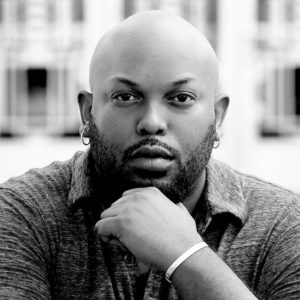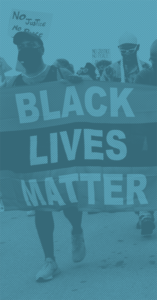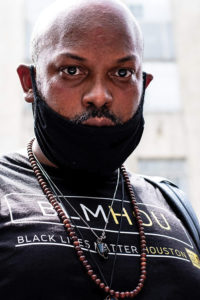He Isn’t Big on Reform, He’s Big on Change: The Humanist Interview with Ashton Woods

Ashton Woods is a New Orleans native who has called Houston, Texas, home since 2005. In addition to his focus on holding law enforcement and public officials accountable to the citizens of his city and ending violence against people of color, Woods is a longtime activist and advocate for the homeless, for affordable housing, victims of sexual assault, the LGBTQ community, and people living with HIV/AIDS.
In the aftermath of Michael Brown’s 2014 killing by police in Ferguson, Missouri, Woods cofounded Black Lives Matter Houston and is the group’s lead organizer. He is also the chair of the American Humanist Association’s Black Humanist Alliance and is on the board of Humanists of Houston (a chapter of the AHA). I spoke with Woods by phone on June 5 as protests continued across the country in the aftermath of the police killing of George Floyd in Minneapolis, Minnesota, on May 25, 2020.
Jennifer Bardi: I imagine you’re incredibly busy right now as lead organizer for Black Lives Matter Houston. This is also, of course, a very painful and potent time, so I wanted to start out by thanking you for your time. You founded Black Lives Matter (BLM) in Houston, which was George Floyd’s hometown. Can you talk a little bit about what the protests and activism have been like there?

Photo by Mike Shaheen
Ashton Woods: We started with a protest on May 29 that BLM Houston organized. Then it went from there with spontaneous and pop-up protests. These past few days, there were 60,000 people on hand. We were out there making sure that people were there in George Floyd’s name. That’s what this has been about.
We’ve also been pushing to make sure that, while the city is in budget negotiations with the Houston Police Department (HPD), we take advantage of the situation and make sure that we get real policy changes, like defunding the police. There’s a billion dollars on the table right here in Houston that would be added to the HPD budget if the city council approves it. We’re trying to put the kibosh on that. That money does not need to go to the police department while the city is laying off people because of COVID-19 and cutting other departments.
JB: In a 2017 interview with TheHumanist.com you talked about your work on the Sandra Bland Act. You highlighted your efforts to push the Texas legislature to pass bills to abolish the ability for police to make arrests for misdemeanor charges. Now, bills are being introduced in Congress to end funneling of military equipment to local police, to end the so-called “qualified immunity” protections for cops—
AW: But qualified immunity has another basis though, and I think people don’t know that. There’s this idea of police being able to do what they want to do, but under the law, when they write a police report, they’re actually swearing under oath. When they complete their report and put their signature on it, it’s a sworn affidavit. People here in Houston who have been arrested and given charges for blocking the freeway when they were literally downtown are going to have a field day with that.
JB: You’ve been critical of Houston Police Chief Art Acevedo, who was praised for talking to protesters and sounding like an ally. What is your specific criticism of him?
AW: First of all, the Houston Police Department is one of five in the entire United States that has redacted general orders. General orders are basically their rules and regulations for what they can and cannot do. So, Acevedo has been going around and hugging protesters and then giving orders for tear gas. [Under his leadership] protesters were made to sit ten hours straight without anything to eat or medical attention.
So, he can play that game if he wants to, but he’s not transparent. Six people were murdered here in Houston between April 25 and May 30. Those deaths have gone ignored because he and the mayor are sweeping them under the rug. We are here to hold them accountable.
JB: Do you think those murders will now be investigated?
AW: I don’t know yet. I mean, obviously that’s one of the issues. But it seems to me like they’re dragging their feet and they just want it to go away.
“The critical question is: Where are you going to be six months from now? Are you going to be at home comfortable, or will you be out there making sure that rights are being enforced and that people are actually being treated fairly?”
JB: We’ve been here before—the violence against Black Americans prompts protests and reckoning. No real systemic change occurs, and then it all repeats. But do you feel like this moment is different? For example, the city of Ferguson just elected its first Black mayor, Ella Jones. More Confederate statues are coming down, and so on. Does this moment feel different in the sense of a tipping point?
AW: We have been building up to this moment. And you’ve got to think about the differences [with Floyd’s death] compared to other murders of Black people by police. It was eight minutes and forty-six seconds of somebody saying “I can’t breathe,” calling for their mother, and pleading for their life. That’s something tangible and something you can see.
The critical question that needs to come from this entire situation is where you’re going to be six months from now. Are you going to be at home comfortable, or will you be out there making sure that rights are actually being enforced and that people are actually being treated fairly and asking if institutional racism is actually being addressed in an honest way? Those things are starting to happen and we’re going to have these conversations, but we haven’t gotten there yet.
People showed up in all fifty states, in towns big and small, to protest in the name of George Floyd, but a lot of people are saying: stand up and hold your city council members, the court commissioner, the judiciaries, and legislative bodies accountable to do what needs to be done, so that not only is the law there but the law is actually enforced. So that when we get community review boards, they actually have teeth; they’re not done by political appointment to reward somebody who only donated to that person when they were running for office.
I’m not big on reform—I’m big on change. And the best way to effect change is to take out what doesn’t work and fill in the gap. Right now, I think we need to start filling in the gap.
JB: The focus right now is rightly on police and their unions, and the systemic racism that has been breeding there forever. But, of course, racism in this country also permeates employment, housing, and healthcare. You wrote in the last issue of the Humanist about how the coronavirus has exposed racial disparities. What can be done to assist Black protesters who are out there doing this important work and are being exposed to the virus?

Photo by Eric Edward Schell
AW: I think we should take into consideration that the people who are exposing us to the virus more often than not are the police when they use their tear gas and their pepper spray, because those things affect the respiratory system. They were the ones confiscating PPE [personal protective equipment] from people. They were the ones making people get in close contact. The protests will not be the reason for the spike of COVID-19. That was coming anyway because the states were reopening.
And we have been practicing social distancing. At our protest we set up tables and put out gloves, masks, hand sanitizer. We gave out water and had medics on hand. When you make arrests like they did here in Houston and put a bunch of people in a back room without PPE, first aid, or anything like that, it’s on the government body.
JB: In thinking about the virus, Dr. Anthony Fauci said recently that the United States could have several hundred million doses of a coronavirus vaccine by the beginning of 2021. If we’re really going to tackle the long-time oppression of Black Americans, who have been disproportionately affected by the virus for reasons related to systemic racism, why not, as reparation, prioritize them to receive the vaccine?
AW: I think everybody should be prioritized. The most vulnerable populations—that would be the Black and brown communities—would be best served. But I would also recommend that we talk about people who are living with physical and mental disabilities and those who take medicines that compromise or weaken their immune system. I think about that all the time, but I think what needs to happen beyond the coronavirus is that our health system needs a complete overhaul.
JB: Tackling the health care system got a lot of attention during the primary debates. If Joe Biden is elected, do you think it’s going to be a priority for him?
AW: I can’t say. I’m reluctantly voting for him. I’m really not looking forward to having another president who doesn’t know what’s it like to be Black or female. I can only imagine that he might make a decision as president based on those ideologies we’ve seen a thousand times that I disagree with. It makes him no better than Donald Trump. Sometimes, I feel like they’re that meme with the two Spidermen pointing at each other.
JB: Biden will very likely pick a Black woman as his running mate, who, guaranteed, will be different than Pence. In terms of the election, Trump has threatened to withhold aid from states that enable vote-by-mail campaigns. How do you see voting rights playing into what we’re experiencing right now?
AW: To want people to stand in line to vote and be exposed to the pandemic says to me that you are a genocidal maniac. It took a pandemic for companies, corporations, and businesses big and small to do what they’ve been doing as far as curbside pickup and hiring people to clean and do other things, and they’ve streamlined their services to be more efficient so that people won’t be exposed to the virus. Then Trump threatens to withhold funding from states who allow vote by mail. The thing is, most times he can’t withhold anything; a lot of his budget measures have to get approved by Congress. So, he can talk all he wants to.
“To say you don’t see color is to erase the fact that I have blackness, that I have to deal with issues of racism.”
JB: It scares me when you see what happened in the Wisconsin primary and the Supreme Court’s decision to force in-person voting. How do you fight that?
AW: Well, if they take both houses of Congress, Democrats can always create a new bill after a Supreme Court ruling. There’s always that.
JB: You’re the chair of the Black Humanist Alliance, and you’ve spoken before in these pages about your lack of religious belief. Does it bother you that some religious leaders seemed to be more vocally upset about Trump standing outside St. John’s Church holding a Bible than they were about white supremacy and the violence against Black people?
AW: They can be mad about what they want, but I have seen clergy step up and be ecumenical, hold their congregations accountable, and call out racism for what it is. I don’t really give credence to people who are more mad about what happened at the church as opposed to the systemic and institutional racism that we’re witnessing right now. I’m used to it. It’s something that’s always been there but not visible to many people.
JB: Something refreshing I’ve heard several times from people interviewed at protests—when asked about Trump they don’t want to talk about him. They say this is about so much more. Of course, humanists are very concerned about the elevated status of religion in our society, and the Bible stunt was what it was. The much bigger issue was the violence that took place to clear the area for the president to walk over to the church for the photo op. It’s about why the protesters were out there in the first place.
AW: Right.
JB: What about the role of Black humanists in all this? Do you see a specific role for Black humanists to sustain the power of Black Lives Matter?
AW: I think it’s an all-hands-on-deck type of thing. I think that Black humanists are operating in different parts of the community, as we always have. We’ll always have a lasting effect because we’re raising our voices. I’m also a part of the LGBTQ community, so there are things that might arise that I would adjust to. That’s automatic because being Black is to adjust all the time for survival.
JB: Do you feel like you’re able to reach somewhat different audiences with a similar message?
AW: Of course. The atheist community follows me, the LGBTQ community follows me. There are audiences outside of my main group which I guess would serve to answer that question, but I think the bigger aspect of it is that it just depends on where you are. I’m also on the board of the AHA chapter here, Humanists of Houston, and we’re pretty active.
JB: Is there anything else you want to share with readers of the Humanist?
AW: Just that they need to start thinking about where they’re going to be six months from now. Are they still going to be out looking for justice for George Floyd, Breonna Taylor, and every other Black person who’s ever been murdered at the hands of police? Will they be working against systemic and institutional racism? Because we have to start looking beyond just putting police on trial. We have to start looking at abolishing laws and policies that empower them to do what they do.
JB: And in terms of organizations, the power at the top is mostly held by white people. How can an organization that’s trying to diversify but hasn’t gotten to the top levels really meet the challenge?
AW: First of all, it takes people who don’t spout that bs about “I don’t see color,” because you do see color. To say that you don’t see color is to erase the fact that I have blackness, that I have to deal with issues of racism. It absolves you of your responsibility of owning up to your own racism, collectively as white folk. And second, I think that organizations shouldn’t hire for diversity’s sake. Because at the end of the day, if you don’t put Black and brown people in positions of power and actually let them use their voices, you’re just using them as tokens. Make sure you pay people like you would want to be paid and you treat people how you want to be treated. Because 501(c)(3)s have the tendency to hire social justice activists, then all of a sudden they try to control them. They try to make it very hard for them to do what they were hired to do.
JB: Thank you so much. Ashton, I really appreciate your time, and I hope you stay safe.
